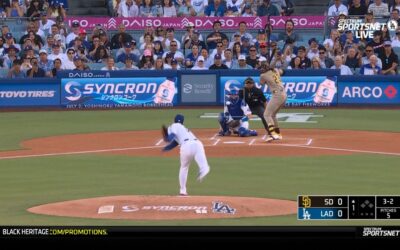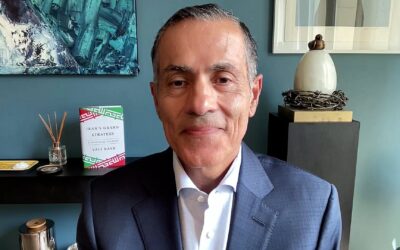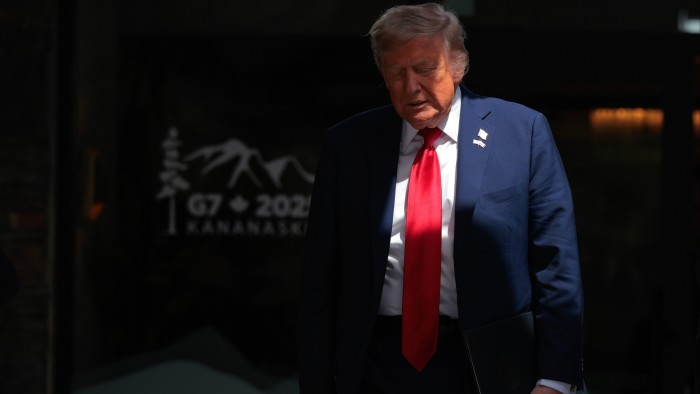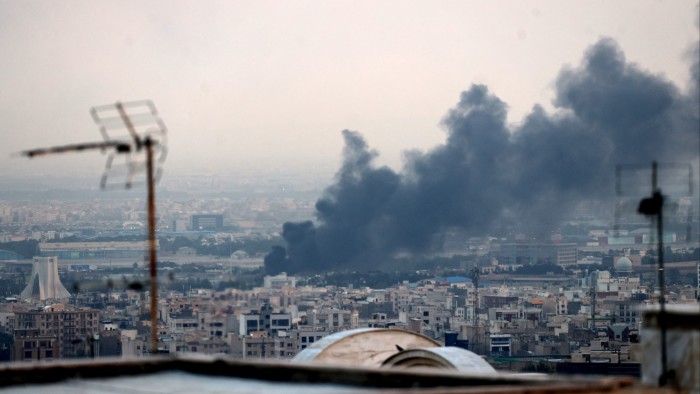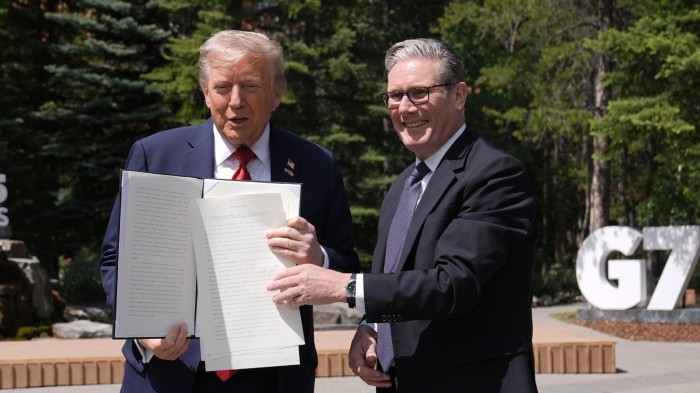Trump opens G7 summit by criticising Russia’s exclusion

Unlock the White House Watch newsletter for free
Your guide to what Trump’s second term means for Washington, business and the world
Donald Trump said it was a “big mistake” to exclude Russia from G7 summits as he used his opening remarks of the meeting in Canada’s Rocky Mountains to lament the group’s treatment of Moscow.
The US president delivered his complaint flanked by Mark Carney, Canada’s prime minister, marking an awkward start to this year’s summit, which is being dominated by war in the Middle East, trade tensions and Washington’s inability to broker a peace deal in Ukraine.
Trump has long said he would like to see the G7 return to a G8 format, bringing Moscow back into the fold as it was before Russia’s annexation of Crimea in 2014.
“This was a big mistake. You wouldn’t have that war,” Trump said, referring to Russia’s full-scale invasion of Ukraine, which started in 2022. “[Russia’s President Vladimir] Putin speaks to me, he doesn’t speak to anybody else because he was insulted when he got thrown out of the G8.”
Trump said it was “not a bad idea” to have China as part of the G7, which has for decades included the world’s largest industrialised economies and liberal democracies. China and Russia are part of the G20, a wider multilateral group that includes the world’s largest economies.
Trump’s recriminations came as Volodymyr Zelenskyy, Ukraine’s president, was invited to join the group on Tuesday for a special session on the conflict with Russia. Trump and Zelenskyy are also expected to have a bilateral meeting on Tuesday.
In his own opening remarks, Carney had wished Trump a happy birthday — he turned 79 on Saturday — and noted the “G7 is nothing without US leadership”.
Trump and Carney had bilateral talks following the opening remarks, which Canadian officials described as “productive” and “focused on advancing the ongoing negotiations around the trade and security relationship between the two countries”.
The US and Canada have been trying to reach a settlement to the trade disputes that have flared after Trump imposed steep new tariffs on Canadian metal imports into the US, but it was unclear if there was any breakthrough in sight. “We’re going to see if we can get to the bottom of it today,” Trump said.
It was unclear whether G7 leaders would find a common position or message on the conflict between Israel and Iran that broke out on the eve of the summit, but Trump urged Tehran to negotiate.
“It’s painful for both parties, but I’d say Iran is not winning this war, and they should talk,” Trump said. “And they should talk immediately, before it’s too late.”
When asked whether the US had provided intelligence support for Israel, Trump said Washington “had always supported Israel” and added “Israel is doing very well right now”.
Managing Trump has been an unofficial theme for other G7 leaders, who fear his often inconsistent positions on matters of diplomacy and trade make reaching consensus challenging.
Trump’s threat to make Canada the 51st state of the US has added a personal edge for Carney, who is hosting the summit.
He met with Prime Minister Sir Keir Starmer in Ottawa on Saturday and Sunday, with the UK leader emphasising Canada’s “sovereignty” as part of the Commonwealth.
On Sunday evening in Kananaskis, Carney and Starmer had drinks with French President Emmanuel Macron, Italy’s Prime Minister Giorgia Meloni and German Chancellor Friedrich Merz.
Aides insisted the unofficial meeting over wine was spontaneous, but observers viewed it as a last-minute co-ordination session over handling Trump during the summit.
Starmer insisted on Monday that there was “consensus for de-escalation” in the Israel-Iran conflict among the G7 leaders. He is expected to meet with Trump later in the day.
But people familiar with the matter said there was as no statement on the conflict agreed by the G7 leaders.
